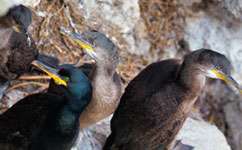Parasites boost advantage in sibling war

(Phys.org) -- Parasites may increase inequality among baby birds in a brood by making it even harder for smaller, weaker chicks to compete against their bigger brothers and sisters, researchers have discovered.
For birds, it's essential to get a good start in life. The difference in size between new born chicks often increases as they grow up – those that start out smaller often never catch up.
Bigger chicks can muscle in on food supplies, taking their smaller sibling's share. And as the runts remain small, they may be more vulnerable to parasites which hinder their development even further. Parasites essentially make the life chances of chicks in the brood more unequal.
Researchers from the University of Edinburgh and the Centre for Ecology & Hydrology found that when nestlings of the European shag were treated with anti-parasite drugs, the smaller nestlings grew faster and better. But surprisingly, the bigger chicks in these coastal broods did worse when dosed with the medicine.
'Our initial expectation was just that the runts would perform better,' says Dr Tom Reed, now at the Netherlands Institute of Ecology, co-author of the report published in PloS one. 'It did come as a surprise that the bigger chicks did worse.'
The researchers considered several explanations. They think that bigger chicks are losing out in treated nests because their parents can only bring back so much food, so that siblings are always competing. When not held back by parasites, the upstart smaller siblings have more chance of taking their fair share of the meals. This means the bigger siblings lose out.
'The way that we've interpreted it is that there's a certain amount of effort that the parents can invest, and when the nests are dosed the little guys are better able to compete,' Reed adds.
This explanation, which emphasises the strong sibling rivalry in birds' nests, is currently just a hypothesis.
'It may otherwise be the case that smaller chicks benefit from anti-parasite treatment because they're diverting less energy to fighting parasites. Alternatively, the older chicks may in some way be negatively affected by the drug,' says Reed.
The team is now carrying out further research to see whether this boost to the runts' begging skills is really what's harming the bigger chicks.
This work's conclusions will contribute to a growing body of knowledge on how parasites – from roundworms in the birds' guts to feather lice on their skin – affect nestling broods. The group's earlier research on the European shag families, published in Science in 2008, found that when the parents were treated with the drug, the benefits of having healthier, more productive parents largely fell to the male chicks.
'We wanted to see how it affects their ability if you dose the parents,' explains Dr Reed. 'Males are costlier to rear – when parents have this limitation reduced, the males benefit more.'
In a lot of bird species, male chicks are bigger, so rearing sons takes more effort. In healthier times the mother can afford to make that extra effort. But when the mother bird herself is sick, she just can't provide that extra attention to her sons.
This research shows that it's the competition between siblings for limited food supplies from their parents that shapes bird family dynamics, and it's not just limited to the European shag. Eagle chicks have been known to attack their siblings, whilst young pelicans have been caught pushing brothers and sisters out of the nest. Sibling rivalry is not just a human problem.
More information: PLoS One 7(2): e32236, published February 24, 2012, doi:10.1371/journal.pone.0032236
Journal information: PLoS ONE
Provided by PlanetEarth Online



















